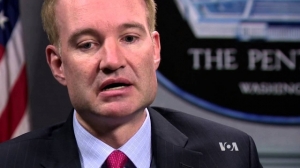Dr Michael Carpenter Talks NATO Aspirations and Warsaw Expectations
On April 22, Douglas Lute, US Ambassador to NATO, while speaking in London, said that even if NATO’s doors are open to new members, it did not intend to expand in the near future. One of the reasons cited was that it could destabilize Russia. To discuss the growing threat coming from Russia and Georgia’s NATO aspirations ahead of the Warsaw summit, Voice of America Georgian Service sat down with Dr. Michael Carpenter, Deputy Assistant Secretary of Defense with responsibility for Russia, Ukraine, and Eurasia, for an exclusive interview.
How do you see aspirant countries like Georgia on one hand, and on the other hand Russia, taking Mr Lute’s statement, and what is your assessment?
US policy is that we firmly support Georgia’s Euro Atlantic aspirations and that we stand by the message from the Budapest Summit in 2008 that affirms that Georgia and Ukraine would become members of NATO, this language further reaffirmed in subsequent summits in Chicago and Wales. Our policy has not changed; we have a robust series of tools to support Georgia, including the Annual National Plan. NATO’s door remains open and all support continues. I’m proud to say that the Alliance will expand and, by inviting Montenegro, there is no better testament to that expansion.
Do you believe the West should modify its strategy towards Russia to deter Moscow? Does, as General Breedlove said, Russia and instability on Europe’s southern flank pose serious threats to US and European security interests?
There is no doubt that Russia’s aggressive actions in Ukraine have caused the Alliance to take a good look and reevaluate its security posture. There is a real need, following Russia’s aggressive moves in Ukraine, to enhance deterrence and defense of the Alliance. What you saw in Ukraine is a violation of the bedrock security of the international order, the inviolability of borders- something we had considered sacrosanct since World War II. So yes, the Alliance is adapting to the new threats it’s facing. As a matter fact, Russia’s security strategy published last year labels NATO and US as threats to Russia. So we are investing in ensuring defense and deterrence capabilities, such as a readiness action plan by NATO which has many different components to it. The US just announced that we’re quadrupling our investment to help European allies to USD 3.4 billion, and that will go to a variety of lines of effort to enhance rotational force posture in Europe by US forces, to include more pre-positioning of war-fighting equipment- the most modern war-fighting equipment, especially on the Eastern Flank of the Alliance and also other areas, more training, more exercises. It will include more investment in infrastructure to enable our forces to come in during the event of crises, and move rapidly. And lastly, it will invest in the resilience of our non NATO member countries and partners in the region to enable them to withstand coercion and overcome vulnerabilities that they face vis-à-vis aggressive Russia.
Where do you see Georgia-NATO relations in the near future, and what is the most likely outcome of the Warsaw summit for the Alliance and for an aspirant country like Georgia?
NATO and Georgia have a very close relationship. Georgia is the second largest non-NATO member contributor to the Resolute Support mission in Afghanistan. 850 Georgian troops serve there without any caveats. They also contributed to the Iraq mission. Georgia is the only non-NATO member to be a member of the NATO response team. We deeply value Georgia’s contributions. Going forward, looking at Warsaw, I expect the Alliance will build off of the substantial package that is underway with Georgia, and this was declared in Wales.
And bilaterally allies will continue to enhance the types of interactions that they have with Georgia. From a US perspective, we’ll look to enhance the types of training, exercises and interactions we have with the Georgian Armed Forces.
How would you characterize US-Georgia cooperation in the defense/military spheres?
I would characterize military-to-military relations as excellent. The tremendous number of troops that Georgia has contributed in Afghanistan are really the best soldiers that we see out there. Georgia has seen 30 of its troops killed and more than 300 wounded in action, so it has really contributed a lot that we greatly value. Going forward, I think there is scope for doing more in Georgia. So as we approach the end of this Administration, we’ll be looking at what other trainings we should put in place to augment the Georgian deployment program- a program that trains Georgian troops to go on an expeditionary mission, like the one in Afghanistan, or to do counter-insurgency operations. All in all we’ll be looking at what other capabilities Georgia will need for self-defense and that will include additional training modules.
Some experts say the lack of the Western reaction, including sanctions, in 2008 during the Russia-Georgia war emboldened Russia to move into Ukraine. Would you agree?
I think we’ve seen over the course of the last 10 years an increasingly assertive and aggressive Russia. We saw that in Georgia. We certainly witnessed that in Ukraine and I think that the international community has recognized that in order to deter this type of aggression in future, significant cost needs to be imposed on Russia for behavior that transgresses international norms. So, as a response in terms of intervention in Crimea, the US has actually lead a diplomatic effort with not only our European partners, but also with others, including Japan, to impose sanctions on Russia. And those sanctions are tied to its intervention in Crimea, as well as subsequent intervention in the Donbas. It is clear that Russia recognizes that if there are costs imposed it will change its behavior. So, I think that this is the policy going forward and that it will serve us well.
Anna Kalandadze












